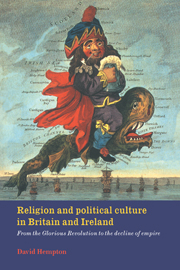 Religion and Political Culture in Britain and Ireland
Religion and Political Culture in Britain and Ireland Published online by Cambridge University Press: 06 January 2010
Thus far our analysis has consisted of a religious tour of the British Isles in the modern period with a number of stopping off points on the way. These have included the investigation of elite and popular Anglicanism at the peak of the Church of England's influence in the long eighteenth century; the spectacular rise of evangelical Nonconformity, particularly Methodism, in the period of the French and industrial revolutions, which increased religious pluralism, but also contributed to the relatively ordered transitions of British society in the nineteenth century; the rise of evangelical Nonconformity in Wales and its relationship to Welsh identity and Liberal politics; the attempts to realise the old sixteenth-century ideal of the godly commonwealth in Scotland and the unwillingness of the British State to fund this ideal; the rise of the Irish Catholic nation as the most conspicuously successful fusion of faith and identity anywhere in the British Isles; the role of religion in creating an Ulster Protestant world-view in opposition to a vigorous Catholic nationalism which has led to one of the most intractable problems of the modern world; and the growth of religious pluralism in urban Britain, and its consequences for national homogeneity, social class and popular belief and practice. Above all, the aim has been an attempt to bring to life the cultural power of living religious traditions and to explore the ways in which religion has interacted with other frameworks within which people in Britain and Ireland sought to express meaning and identity. What has been done so far has been relatively straightforward.
To save this book to your Kindle, first ensure [email protected] is added to your Approved Personal Document E-mail List under your Personal Document Settings on the Manage Your Content and Devices page of your Amazon account. Then enter the ‘name’ part of your Kindle email address below. Find out more about saving to your Kindle.
Note you can select to save to either the @free.kindle.com or @kindle.com variations. ‘@free.kindle.com’ emails are free but can only be saved to your device when it is connected to wi-fi. ‘@kindle.com’ emails can be delivered even when you are not connected to wi-fi, but note that service fees apply.
Find out more about the Kindle Personal Document Service.
To save content items to your account, please confirm that you agree to abide by our usage policies. If this is the first time you use this feature, you will be asked to authorise Cambridge Core to connect with your account. Find out more about saving content to Dropbox.
To save content items to your account, please confirm that you agree to abide by our usage policies. If this is the first time you use this feature, you will be asked to authorise Cambridge Core to connect with your account. Find out more about saving content to Google Drive.